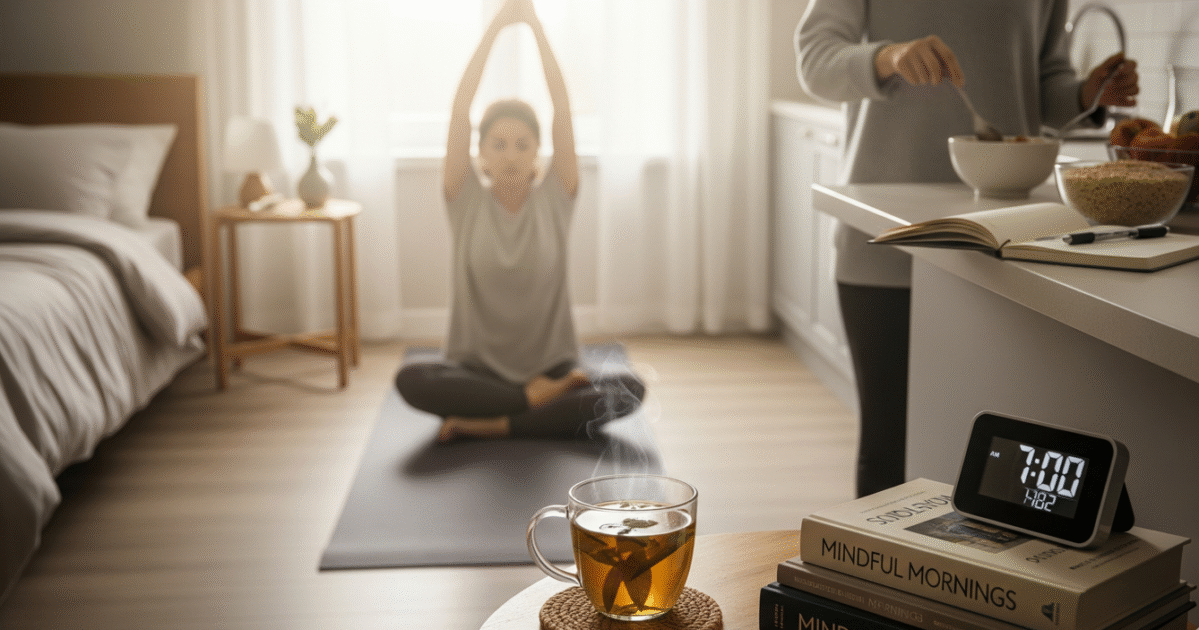Warning: Cannot modify header information - headers already sent in /home/u278635817/domains/mymorninglife.com/public_html/wp-content/plugins/artigosgpt/artigosgpt.php on line 29509
Warning: Cannot modify header information - headers already sent in /home/u278635817/domains/mymorninglife.com/public_html/wp-content/plugins/artigosgpt/artigosgpt.php on line 29509
What if the secret to a restful night’s sleep begins the moment you wake up? Many of us obsess over nighttime routines, but the truth is, morning habits improve sleep far more than you might realize. Your early-day actions set the tone for your body’s internal clock, shaping how quickly and deeply you drift off when night falls.
Understanding how morning rituals influence your circadian rhythm is key to unlocking better sleep. From the moment you open your eyes, simple habits can reset your biological clock, boosting your ability to fall asleep faster and stay asleep longer.
In this article, you’ll discover seven powerful morning habits proven to improve sleep, backed by science and designed for real-life application. Whether you struggle with restless nights or want to optimize your rest, these tips offer a fresh perspective on sleep health.
Contents
Toggle1. Soak Up Natural Light Right After Waking
Boost Your Circadian Rhythm
Exposure to natural light in the morning signals your brain to stop producing melatonin, the sleep hormone. This reset helps align your internal clock, making you feel more alert during the day and sleepy at night.
Sunlight triggers serotonin production, which not only lifts your mood but also promotes better sleep later. Aim for at least 15–30 minutes of morning sunlight daily to maximize this effect.
How Morning Light Enhances Sleep Quality
Research shows that consistent morning light exposure strengthens your circadian rhythm, reducing sleep disturbances. This natural cue helps your body anticipate bedtime, improving overall sleep quality.
By making morning light a habit, you help regulate your body’s temperature and hormone cycles, essential for deep, restorative rest.
Tips for Increasing Morning Sunlight
- Open curtains immediately after waking.
- Enjoy breakfast near a window or outside.
- Take a brisk walk outdoors within the first hour of your day.
2. Establish a Consistent Wake-Up Time
Stabilize Your Internal Clock
Waking up at the same time every day, even on weekends, trains your circadian rhythm. This regularity helps your body anticipate sleep and wake cycles naturally.
Consistency decreases the likelihood of sleep inertia and improves daytime energy levels, making it easier to fall asleep at night.
Why Routine Matters for Sleep
Irregular wake times disrupt your internal clock, leading to fragmented sleep and grogginess. A steady schedule anchors your sleep-wake cycle, enhancing your overall sleep architecture.
Stick to your chosen wake-up time to reinforce your body’s natural rhythms and improve sleep efficiency.
How to Set a Wake-Up Routine
- Choose a realistic wake-up time that suits your lifestyle.
- Set an alarm and avoid hitting snooze.
- Get out of bed immediately after waking.
- Maintain this schedule every day, including weekends.
3. Hydrate Early to Kickstart Your Metabolism
Hydration’s Role in Sleep Regulation
Drinking water first thing helps flush out toxins and supports metabolic functions that influence sleep. Proper hydration prevents nocturnal disruptions linked to dehydration.
Starting your day with water also aids digestion and energy levels, contributing indirectly to better sleep patterns.
How Morning Hydration Enhances Rest
Dehydration can cause dry mouth and leg cramps, common culprits behind nighttime awakenings. Staying hydrated from morning reduces these risks.
Hydration supports hormone balance, including cortisol, which impacts your sleep-wake cycle.
Simple Hydration Tips
- Drink a glass of water immediately upon waking.
- Add lemon for flavor and vitamin C.
- Avoid caffeine until after hydrating.
4. Incorporate Morning Movement or Exercise
Exercise as a Sleep Booster
Morning physical activity raises your core body temperature and triggers endorphin release, enhancing alertness and mood. This activity also promotes deeper sleep cycles at night.
Consistent exercise aligns your circadian rhythm and reduces stress, both crucial for falling asleep quickly.
Types of Morning Exercises That Help Sleep
Low-impact activities like yoga or brisk walking are excellent choices. They stimulate your body without overtaxing your nervous system, which can interfere with sleep if done late in the day.
Even a short 20-minute routine can make a significant difference in sleep quality.
Morning Movement Hacks
- Wake up 30 minutes earlier for light stretching or yoga.
- Take a brisk walk outdoors to combine movement and sunlight.
- Try bodyweight exercises like squats or lunges.
- Stay consistent to build a lasting habit.
5. Limit Morning Caffeine Intake
Balancing Alertness and Sleep
While caffeine boosts morning alertness, excessive intake or late consumption disrupts sleep onset. Moderating caffeine in the morning helps maintain your natural sleep-wake cycle.
Opt for moderate amounts early to avoid overstimulation that can delay nighttime sleep.
Optimal Caffeine Timing
Consume caffeine within the first 1–2 hours after waking to harness its benefits without interfering with melatonin production later.
Avoid caffeine after mid-morning to ensure it doesn’t affect your ability to fall asleep hours later.
Smart Caffeine Habits
- Limit coffee to one or two cups before 10 AM.
- Try herbal teas or decaf options later in the day.
- Listen to your body’s response and adjust accordingly.
6. Eat a Balanced Breakfast to Regulate Sleep Hormones
Nutrition’s Impact on Sleep
A morning meal rich in protein, fiber, and healthy fats stabilizes blood sugar and hormone levels, including cortisol and insulin, which influence sleep timing.
Skipping breakfast or eating sugary foods can cause energy crashes and disrupt your sleep-wake rhythm.
What to Include in Your Breakfast
Incorporate whole grains, lean protein, and fruits to provide sustained energy and support hormone balance.
This nutritional foundation promotes alertness during the day and relaxation at night.
Breakfast Ideas for Better Sleep
- Oatmeal with nuts and berries.
- Greek yogurt with chia seeds and fruit.
- Whole-grain toast with avocado and eggs.
- Smoothie with spinach, banana, and protein powder.
7. Practice Mindful Morning Moments to Reduce Stress
Stress and Sleep Connection
Starting your day with mindfulness or meditation lowers cortisol levels, the stress hormone that can interfere with falling asleep.
Mindful mornings set a calm tone, reducing anxiety and racing thoughts that often keep people awake at night.
Effective Morning Mindfulness Techniques
Simple breathing exercises, journaling, or gratitude practices help anchor your mind and body, improving sleep readiness.
Even five minutes of mindfulness can create lasting benefits for your sleep cycle.
Mindfulness Practice Steps
- Find a quiet space immediately after waking.
- Focus on deep, slow breaths for 3–5 minutes.
- Write down three things you’re grateful for.
- Set a positive intention for the day.
| Morning Habit | Sleep Benefit | Recommended Duration/Frequency |
|---|---|---|
| Exposure to Natural Light | Resets circadian rhythm, improves melatonin production | 15-30 minutes daily |
| Consistent Wake-Up Time | Strengthens internal clock, reduces sleep inertia | Daily, including weekends |
| Hydration | Prevents nighttime cramps, supports hormone balance | 1 glass of water every morning |
| Morning Exercise | Enhances sleep depth, reduces stress | 20-30 minutes, 3-5 times/week |
| Moderate Caffeine Intake | Avoids overstimulation, supports sleep onset | 1-2 cups before 10 AM |
| Balanced Breakfast | Stabilizes blood sugar, regulates hormones | Daily, within 1 hour of waking |
| Mindfulness Practice | Reduces stress, lowers cortisol levels | 5-10 minutes daily |
By adopting these morning habits, you’re not just improving your wake-up routine—you’re setting the stage for a night of deep, restorative sleep. Remember, better nights start with better mornings.
FAQ
How quickly can morning habits improve my sleep?
Most people notice improvements within one to two weeks of consistently applying morning habits like regular wake times and natural light exposure. However, the full benefits for sleep quality may take several weeks as your circadian rhythm stabilizes.
Can morning exercise really help if I’m not a morning person?
Yes. Even light activity such as stretching or a short walk can reset your internal clock and reduce stress. Start with small, manageable sessions and gradually increase as your body adapts.
Is it okay to drink coffee first thing in the morning?
Drinking coffee soon after waking is generally fine, but limit it to one or two cups within the first two hours. Avoid caffeine later in the day to prevent interference with melatonin production and sleep onset.
Why is consistent wake-up time important for sleep?
Regular wake-up times help synchronize your body’s circadian rhythm, making it easier to fall asleep and wake up naturally. Irregular schedules can disrupt hormone cycles and cause fragmented sleep.
What if I can’t get natural sunlight in the morning?
If natural sunlight isn’t accessible, consider using a light therapy box that mimics natural light. This can help regulate your circadian rhythm and improve sleep patterns, especially during darker months.
For more insights on optimizing your sleep through lifestyle, visit Sleep Foundation and CDC Sleep Health.
More Articles




























